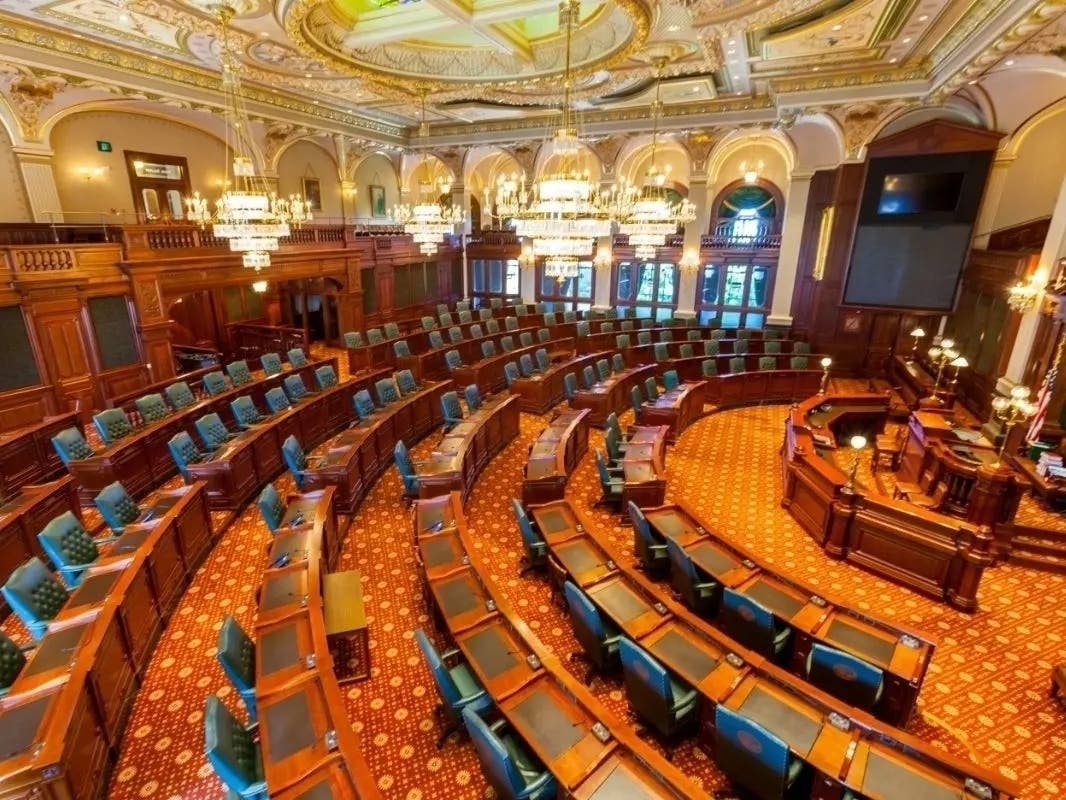Politics & Government
Health Care Right Of Conscience Change Headed To Governor's Desk
While the amendment prevents the conscientious refusal of COVID-19 vaccine and testing mandates, religious and medical exemptions remain.

SPRINGFIELD, IL — As the end of the fall veto session drew to a close, the Illinois Senate approved an amendment to the Health Care Right of Conscience Act aimed at preventing its use to circumvent COVID-19 prevention measures.
Originally passed in 1977 and intended shield health care professionals from civil liability for the conscientious refusal to provide contraceptives or abortion services and amended several times since, the HCRCA also protects people who do not want to receive medical treatment from discrimination.
The just-approved amendment permits public or private entities to avoid running afoul of the law when undertaking any measures or imposing any requirements "intended to prevent contraction or transmission or COVID-19 or any pathogens that result in COVID-19 or any of its subsequent iterations. It is not a violation of this Act to enforce such measures or requirements."
Find out what's happening in Evanstonwith free, real-time updates from Patch.
Gov. J.B. Pritzker indicated he intends to sign the legislation, which was sponsored by State Rep. Robyn Gabel (D-Evanston) and Senate President Don Harmon (D-Oak Park).
“We have effective tools to fight this pandemic — namely, vaccines, masks and testing — and all of our communities are safer when we use the public health and workplace safety protocols we know to work,” Pritzker said in a statement following the bill's passage.
Find out what's happening in Evanstonwith free, real-time updates from Patch.
"This legislation clarifies existing law’s intent without infringing on federal protections," the governor added. "Ultimately, this means we can keep kids in school, businesses open, neighbors safe, and continue on the path to bring this pandemic to an end.”
On Wednesday, Senate Bill 1169 passed the House by a vote of 64-52, with seven Democratic state representatives joining Republicans in opposition and two Democrats voting present.
Gabel said the amendment does not take away existing rights to claim religious or medical exemptions to vaccine mandates. In a statement following its House passage, the majority leader said it was aimed at ensuring people in high-risk environments like schools, hospitals and veterans homes are protected from COVID-19.
"Unfortunately, a small group of people are distorting the HCRCA to ignore safety efforts that have been thoroughly vetted by the scientific and public health communities," Gabel said. "My legislation will prevent this exploitation and ensure the HCRCA is used the way it was intended."
Late Thursday, the Senate concurred by a vote of 31-24. All Republican members voted against the amendment.
Six Democratic senators joined them: Sens. Rachelle Crowe (D-Glen Carbon), Suzy Glowiak Hilton (D-Western Springs), Michael Hastings (D-Frankfurt), Patrick Joyce (D-Essex), Meg Loughran Cappel (D-Shorewood) and Doris Turner (D-Springfield).
And four Democrats did not vote: Sens. Tom Cullerton (D-Villa Park), Napoleon Harris (D-Harvey), Robert Martwick (D-Chicago) and Antonio Munoz (D-Chicago).
The changes were also backed by the office of Illinois Attorney General Kwame Raoul, which has been tasked with defending the governor's executive orders associated with the COVID-19 pandemic in court.
Raoul's chief of legislative affairs, Ashley Wright, told a House committee Tuesday that failure to pass the bill would prevent the Pritzker administration from being able to keep people safe in nursing homes, veterans homes and schools.
Wright mentioned recent decisions in which judges have cited the law while preventing the termination of employees who refuse to receive the vaccine or testing requirements, Capitol News Illinois reported.
Harmon, the Senate sponsor, said the HCRCA was never intended to allow a conscience exemption to all unwanted legal requirements, comparing it to citing a religious exemption to sobriety testing. But Republican senators portrayed the changes as an infringement on religious liberty and gubernatorial overreach.
“For how long do you think the governor should be allowed to continually issue these executive orders that seem to circumvent the legislative process that allows us as a coequal branch of government an opportunity to have some input and dialogue in that?" Sen. Jason Barickman (R-Bloomington) asked Harmon during the Senate committee hearing on the bill, according to the Chicago Tribune. "How long does that continue?"
Due to the fact it passed during the fall veto session with less than a three-fifth majority, the bill does not take effect until June 1, 2022.
Read more: Health Care Right Of Conscience Act Amendment Passes House
Get more local news delivered straight to your inbox. Sign up for free Patch newsletters and alerts.